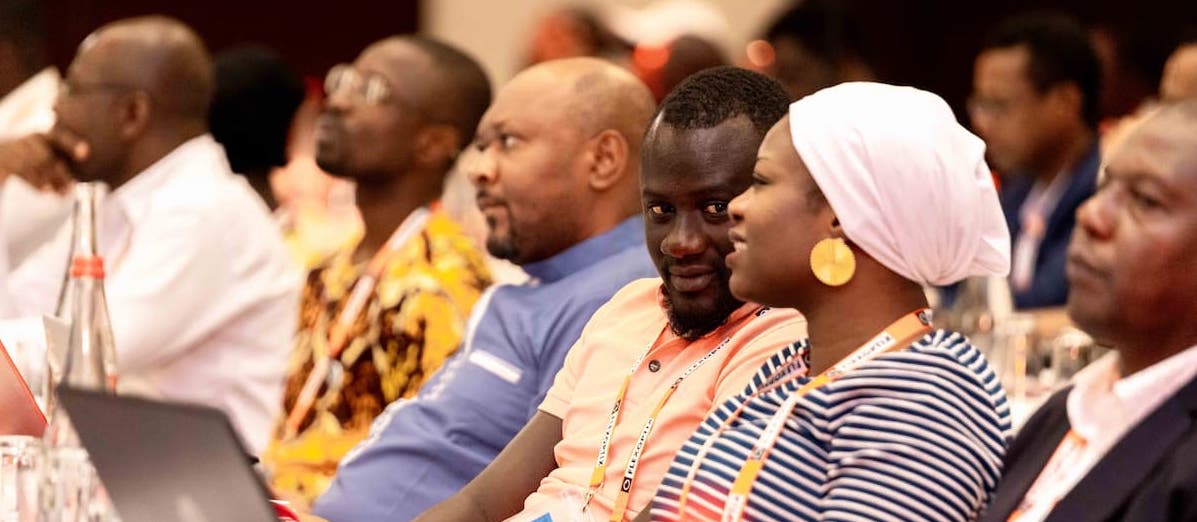There’s no question that strong, resilient infrastructure is critical for keeping people connected. But we recently saw just how important it is to also have a strong community built up to support Internet infrastructure—and each other.
On the morning of 14 March 2024 in 13 Western and Southern African countries, Internet users started logging on to work, making or accepting digital payments for breakfast or their commute, or browsing their favorite social media or news sites only to become frustrated by slow or no connectivity.
This is not uncommon for many in this part of the world. In fact, most of the affected countries this morning rank among the lowest for Internet resilience globally.
As users tried to troubleshoot the issue themselves—turning devices off and on or seeking assistance from their Internet Service Providers (ISPs)—local and global network operators were also busy trying to determine the cause of this sudden loss of international connectivity and working on ways to restore it.
Later, we would learn that a suspected underwater rock slide off the coast of Côte d’Ivoire impacted four submarine cables. At the time of writing, three of the four cables are still being repaired, with some not expected to be fully functional until two months after the 14 March incident—not an uncommon timeframe given the logistics required to commission and sail one of the ~60 ships that lay and repair the 530 odd submarine cables that collectively serve more than 90% of intercontinental data traffic.
Historically, these events would have compromised Internet connectivity in many of these countries for weeks or months, particularly those that are only serviced by one or more of these particular cables—some countries were also serviced by other submarine cables that were not affected.
However, years of community and capacity development and investment in infrastructure to sustain local connectivity during such outages, which the Internet Society and its partners have supported for more than two decades, paid off.
Within hours or, in worst-case scenarios, days, Internet connectivity started returning to normal or at least sustainable levels in all 13 countries as local network operators across the region began sharing and organizing alternative routes to reconnect their networks and countries to international destinations via cross-border terrestrial fiber and other unaffected submarine cables.
It’s important to note that while Internet users in the affected countries may not have been able to access many international cloud services such as Microsoft, most local Internet traffic was still being routed in-country thanks to the presence of Internet exchange points (IXPs) and locally cached data.
Fostering a Sense of Community
The relatively quick return to connectivity for this region would not have been possible without the technical community’s collaboration. In the past 20+ years in Africa, the focus has been on building stronger connections at both human and infrastructure levels.
National, sub-regional, and regional Network Operator Groups (NOGs) and peering forums have perhaps had the largest legacy on Africa’s Internet development.
Since the first Africa NOG (AFNOG) in 2000, these groups and events have nurtured the current generation of network engineers who oversee the maintenance and development of Africa’s Internet infrastructure, performance, and security through technical training, promoting best current practices, and developing a sense of community within the industry.
Before these groups and events became a part of the Internet landscape in Africa, most network operators would have relied predominantly on vendor training and experience. While this training and experience remain useful, relying on them solely reduces the opportunity to share and learn from local experiences—good and bad, and no matter what the vendor—that help enhance network diversity and, with it, resilience.
More so, many of the peering and interconnection relationships that were essential for network operators to quickly establish alternative paths for their regional and international connectivity during this recent outage were forged through these community events.
A Timeline of Technical Community Building in Africa
Network Operator Groups
Established: 2000
Through its Sustainable Technical Communities funding program, the Internet Society has supported and presented at almost 20 different African Network Operator Group (NOG) meetings.
Impact: NOGs contribute to the exchange of knowledge and best practices on technical topics related to the development and evolution of the Internet, including peering and strengthening technical communities’ position to offer advice on the implementation of Internet-related policies and regulations and to serve as a focal point on technical expertise for their identified ecosystem(s).
Sustainable Peering Infrastructure Funding Program
Established: 2009
The Internet Society’s Sustainable Peering Infrastructure funding program provides grant funds, thanks to ICANN and Meta, up to USD $50,000 to assist in training, capacity building, community and regional development, and equipment purchases.
Impact: In the last three years, the Internet Society has supported IXPs in 19 countries, helping to increase traffic to some of them by up to 233%.
The African Peering and Interconnection Forum (AfPIF)
Established: 2010
The Internet Society has sponsored, supported, and presented at the African Peering and Interconnection Forum (AfPIF) since 2010. AfPIF addresses the key interconnection, peering, and traffic exchange opportunities and challenges on the continent and provides participants with global and regional insights for maximizing opportunities that will help grow Internet infrastructure and services in Africa.
Impact: AfPIF has become the major community and capacity development event among the network operations community in Africa. Learn more and register for AfPIF 2024, which will be held from August 20 to 22, 2024, in Kinshasa, Democratic Republic of the Congo.
African Union
Established: 2012
The Internet Society has partnered with the African Union since 2012 to build a local stakeholder-driven process to start the dialogue for countries without Internet exchange points (IXPs) with an end goal of establishing a national IXP based on global best practices and initiate a regional process to support the growth of existing national IXPs and ISPs to become Regional IXPs (RIXPs) and Regional Internet carriers (RICs) which includes training and supporting infrastructure and capacity development.
Impact: Together, we conducted technical training in 28 countries, attracting more than 500 participants. We also established IXPs in six African countries (Namibia, Burundi, Swaziland, Gambia, Gabon, and Seychelles).
African Internet Exchange Point Association (AF-IX)
Established: 2012
The African Internet Exchange Point Association (AF-IX) brings together IXP operators from across Africa to coordinate and exchange knowledge. IXPs are core Internet infrastructure services that facilitate large-scale network interconnection and traffic exchange, thereby creating a source of fast, local, cost-effective bandwidth.
Impact: AF-IX organizes workshops mostly alongside the AFPIF meeting specifically for the IXP community in Africa to share knowledge, experience, and technical expertise. The Internet Society is working with AF-IX to transition all organizing commitments to AF-IX before AfPIF 2025.
Africa DNS Forum
Established: 2013
In 2013, the Internet Society collaborated with AFTLD and ICANN to start the Africa DNS Forum series—a knowledge-sharing platform for the ccTLD and DNS communities in Africa.
Impact: The Internet Society transitioned its leadership role to AFTLD and ICANN, which continue to lead the Africa DNS Forum. This has since led to the formation of several national DNS Forums in Benin, Botswana, and Kenya.
Partnership with Meta
Established: 2018
The Internet Society is partnering with Meta to develop local Internet ecosystems and strengthen cross-border interconnections globally.
Impact: Supporting the development of IXPs in Burkina Faso, the Democratic Republic of Congo (DRC), Malawi, Maldives, and Pakistan.
Coalition for Digital Africa’s Internet Exchange Point Initiative
Established: 2023
The Coalition for Digital Africa is an initiative created by the Internet Corporation for Assigned Names and Numbers (ICANN) that aims to bring more Africans online by supporting the development of a robust and secure Internet infrastructure in Africa. IXPs enable the exchange of Internet traffic locally and are essential for any region aspiring to participate fully in the global Internet economy. The initiative is supported by a grant from ICANN and will be implemented by the Internet Society.
Impact: Grants were awarded to three IXPs in Benin, Malawi, and Rwanda to improve their capacity development and technical infrastructure.
Reducing Exposure to Future Risk
As these countries wait for the cables to come back online and full connectivity to return, advocates for greater Internet resilience, including the network operations community and Internet Society chapters, are also working to collate solutions to reduce their exposure to these and other risks to their connectivity.
Such solutions may not be too far off-hand, either, with several new submarine and terrestrial fiber cables and IXPs expected to be connected or upgraded in the next 6–24 months.
All these efforts and the lessons learned in the past month validate the work that Internet Society has done and will continue to do to continue to empower those who defend and grow the Internet in all countries worldwide.
Read our full report on the West Africa submarine cable outage for a technical analysis and a look at the future of improved resilience in the region.
Image © Aubrey Attuquaye Korley

